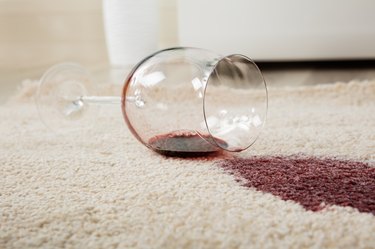Commercial floor cleaners have one thing going for them: They're pretty effective at getting floors clean. They're also expensive, and they're often filled with harsh chemicals you can't even pronounce. Plus, you might not always remember to restock on cleaning products after you run out. Whatever the reason you need a homemade floor cleaner, you probably have plenty of supplies in your kitchen or bathroom that can help you get clean floors with nontoxic ingredients.
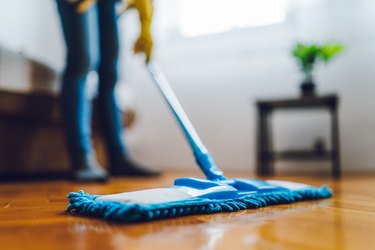
Video of the Day
1. Vinegar, Water and Essential Oils
Plain old white vinegar has always been a staple ingredient in DIY cleaning recipes, and it probably always will be. It's cheap and can break down dirt and other gunk, so it's great for cleaning away whatever gets tracked all over your floors. Vinegar may also kill some of the germs on your floors, though it's not the most effective disinfectant.
Video of the Day
Because vinegar is so acidic, it's not the ideal homemade floor cleaner for every type of floor and may in fact damage waxed, polished or porous surfaces. Use a one-to-one ratio of vinegar and water to clean vinyl or porcelain tiles floors or mop hardwood floors with a more diluted solution of 1/2 to 1 cup vinegar per gallon of water. Substitute apple cider vinegar for white if you prefer. Add a few drops of essential oils to cover the unpleasant lingering smell of vinegar.
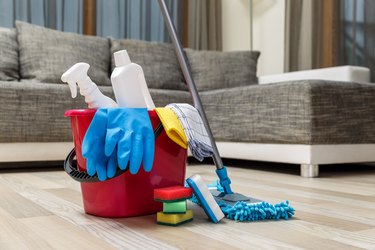
2. Bleach and Water
Many DIY floor cleaners, like vinegar, are great at removing dirt from surfaces but aren't highly effective at killing germs and viruses. Follow your homemade floor cleaner with a bleach and water solution if a person or pet has been sick on the floor or if you're just aiming for a really comprehensive cleaning job. A bleach solution has to air dry, so it's really only good at disinfecting, not washing away dirt and grime.
Bleach must be used with caution and only in well-ventilated rooms where no kids or pets are present, and it can only be used on hard surfaces, like vinyl and nonporous tile floors. It's not advisable to use bleach as a hardwood floor cleaner. If you're going to risk it, test the solution on a small patch and let it dry to check for damage before proceeding. Clorox recommends mopping floors with a solution of 1/3 cup regular bleach in 1 gallon of water. Always wear gloves and old clothes while working with bleach.
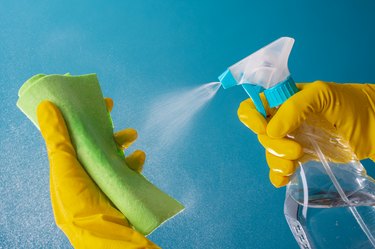
3. Borax and Water
Not everyone keeps borax on hand these days, but if you have a box of the stuff hanging around in your laundry room, you may be able to use it to clean your floors. Borax (a powdered mineral also known as sodium borate) has a reputation as an all-purpose cleaner. In reality, it's safest used on durable tile or vinyl floors only. Dissolve 2 tablespoons of borax in a gallon of warm water to make a mopping solution.
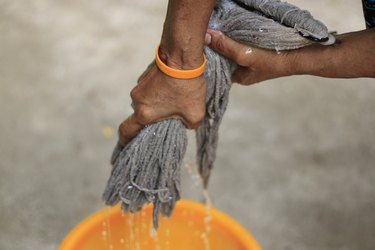
4. Black Tea
Even if you're really more of a coffee person, you might be amazed by how well black tea works on hardwood floors. It's one of the few DIY cleaners that's generally safe for wood. Tea won't dissolve stubborn spills or really disinfect hardwood floors, but it should help give the surface some shine and bring out the natural tones of the hardwood floor.
Simply boil a pot of water, add black tea bags and let the tea steep until the water is cool. The lighter your floors, the fewer tea bags you need. Start with just a few the first time you try this cleaning trick. Dip a sponge or mop in the cooled tea and wring it out so it's just damp before cleaning the floor. First, test the tea in an inconspicuous area to make sure you're OK with any staining effect that occurs.
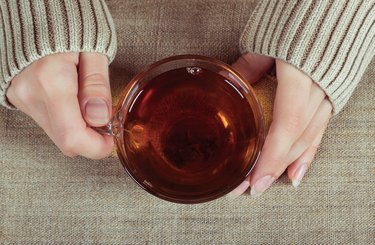
5. Castile Soap and Water
Castile soap is a vegetable-based product that's generally safe for use on wood, stone and laminate floors. A little goes a long way. Add just a few tablespoons of liquid Castile soap or shavings of bar soap to a gallon of hot water to make a big batch of floor cleaner for mopping. Add only a few drops of the soap to a spray bottle of hot water if you're just spot-cleaning dirty patches of floor. Always use a brand-new spray bottle with DIY floor cleaners since old spray bottles may still have traces of other cleaning sprays.
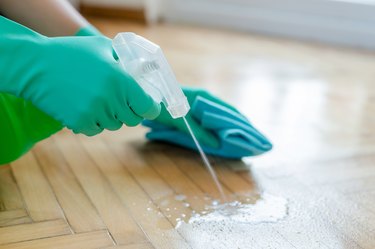
6. Rubbing Alcohol, Vinegar and Water
Rubbing alcohol (also known as isopropyl alcohol) makes a good floor cleaner because it has disinfecting properties. It's too harsh for wood and porous surfaces, but it's suitable for laminate floors. Mix equal parts rubbing alcohol, vinegar and water in a spray bottle and spritz the floor with the solution. Then, follow with a damp mop.
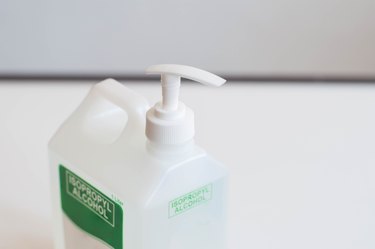
7. Liquid Dish Soap, Water and Vinegar
Liquid dish soap is great at cutting through grease and grime on your dishes, and it can do the same for your nonporous floors. It's an especially good choice as a DIY cleaner for linoleum flooring. Simply add a few squirts of dish soap to a bucket of warm water. Mop with the soapy water and then rinse with a clean, wet mop. You can also mix dish soap and water in a spray bottle and work your way through the room with a damp mop, spritzing a section of floor with the soapy solution and scrubbing with the mop. A splash of vinegar can boost the solution's grime-cutting power if you're cleaning really neglected linoleum flooring.
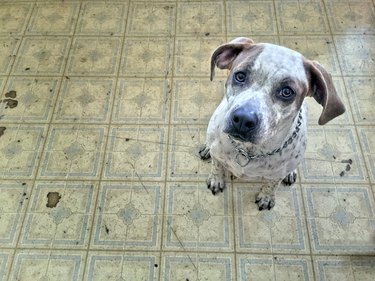
8. Ammonia and Water
Ammonia definitely shouldn't be used to clean most types of flooring, but it can make a good DIY stain remover for carpets made of natural fibers, especially for treating stains created by spilled food or drinks. Dilute one part ammonia in about eight parts water. Spray the solution onto the carpet and blot the area with a dry cloth or sponge. Repeat as necessary.
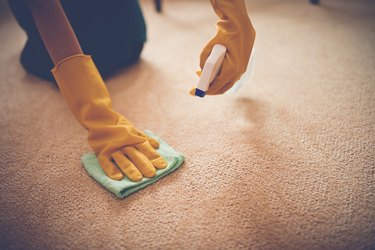
9. Baking Soda and Hydrogen Peroxide
Combine baking soda and hydrogen peroxide and what do you get? A viral TikTok hack and a new favorite way to clean grungy or stained tile floors. Make a paste of two parts baking soda and one part hydrogen peroxide to scrub all over the tile. Let it sit for about 30 minutes before rinsing with water. This trick will whiten both tile and grout.
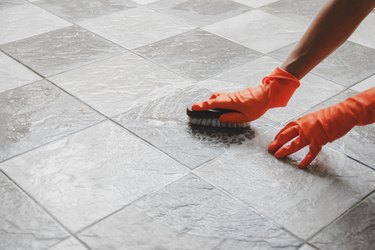
10. Oxygen Bleach and Water
If you already use oxygen bleach to whiten your laundry, it can do double duty as a spot cleaner for carpets. OxiClean says to make a carpet cleaning solution using 16 ounces of water and enough oxygen bleach powder to fill the scoop that comes with each tub to line one. Spray the mixture onto stained carpet, let it sit for five to 10 minutes and follow by blotting the spot with a dry cloth. Before using oxygen bleach to treat stains, always test it on a hidden spot of carpet first to make sure it doesn't damage the fibers.
